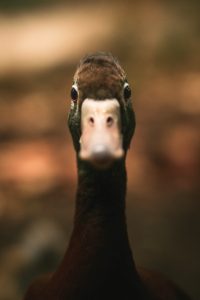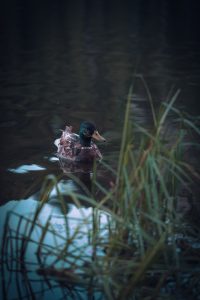 Did you know that ducks have considerably better eyesight than us humans?
Did you know that ducks have considerably better eyesight than us humans?
What about in the dark?
Yep, even in the dark.
It turns out that researchers have made some interesting findings about how well ducks can see.
Knowing a few key facts about how ducks see can influence how you hunt and increase your success rate.
In this article, you will discover these key facts and be able to put these little bits of knowledge to use immediately.
Ducks can see in the dark
Contrary to popular belief, ducks have better vision at night than we do.
Ducks have the ability to adjust the curvature of components in their eyes, making their eyesight very adaptable.
According to Ducks Unlimited, this allows ducks to see the details of what they are looking at from up to 3x farther away than people.
They also see a larger spectrum of light than us humans, including UV light which has some important ramifications. By utilizing the UV light, ducks are able to fly in lower light conditions (the dark).
In fact, ducks do the majority of their migration during the night.

Another difference between how ducks and humans see is that ducks have monocular vision. This means that the area one eye sees does not overlap with the area the other eye sees.
While this has the advantage of giving them a really large field of view, it does put them at a disadvantage when it comes to depth perception.
Now that you know a little more about how ducks can see, let’s look at how this might affect your hunting.
3 Reasons You Should Care about Duck Vision
Ducks can spot low quality decoys
Because ducks can see UV light, other ducks and decoys look different than they do to us.
Even though a decoy looks realistic to you and I, if the amount of UV is off, the duck will notice.
That is why it is important that you purchase quality decoys.
There are companies that use special paint to make the amount of UV look realistic. Flambeau Outdoors has a patented UV paint technology to make the most convincing decoys possible.
Ducks will feed at night
When ducks are heavily pressured by hunters, they will flee to refuges where hunters are not allowed. They will spend less time in the air during the day and adapt by utilizing their good low light vision and feeding more during darker times of day.
Obviously, this isn’t great news for us hunters, but there are a few things you can try that will increase your odds.
First, you can hunt less populated areas. Less hunting pressure generally means more ducks in the air.
Second, you can try hunting during the middle of the week when there are less people hunting.

Ducks fly more during the day in bad weather
Do you like driving during the rain at night?
Well, neither do ducks.
When the weather is bad, the chances ducks fly at night drops and as a result they fly and feed more during the day.
So, since ducks love rain, you have no choice but to get out there and hunt. The worse the conditions, the better your chances of success.
There are ways you can deal with awful weather. For example, a good hand warmer or good decoy gloves can turn miserable into tolerable.
Summary
Now that you know ducks can see in the dark, you will be able to make some adjustments to how you hunt that might bring you more consistent success.
Get yourself some good decoys, avoid the weekends, and hunt when the weather sucks. These seemingly small adjustments can add up over time.









